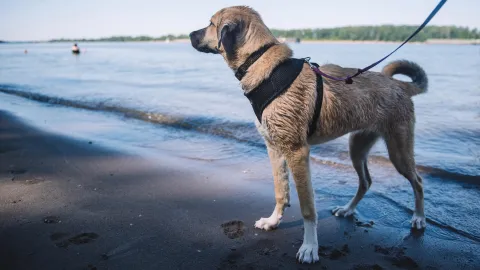
It's important to protect pets from the heat to avoid heatstroke, which can be difficult to treat once it begins, and can be life-threatening. Please consider these suggestions and resources for keeping pets cool in hot weather.
How to keep your pets cool
Pets are cooled primarily by panting and the pads of their paws. Fans do little to cool them off. Consider these steps to keep your furry friends comfortable and safe during a heat wave:
- Make sure your pets have plenty of water.
- Avoid excessive exercise in the heat.
- Make sure pets have shade or a cool space to escape the heat.
- Add ice in their water bowl.
- Fill an outdoor pool with cool water. A note: while lakes, rivers, and streams are popular spots to cool off with dogs, beware of toxic algae blooms.
If your pet is panting excessively—or if your cat is panting at all—wrap them in a wet towel and check for symptoms of heatstroke (see below).
Pets in hot cars
Never leave your pet in a parked car during hot weather, even while it’s running. If you see or hear about a pet in a hot car, it’s important to respond immediately. Lives are at stake. Here’s what to do:
- Call the Multnomah County Animal Services Dispatch at (503) 988-7387. Dispatchers will ask what you observe, and advise of next steps: Is the vehicle in the shade or the sun? Does the animal appear to exhibit any of the signs of heatstroke?
- Animal Control Officers and municipal police departments will respond and recommend next steps. Citizens are also legally permitted to enter a vehicle and remove pets or children in imminent danger of suffering harm if certain requirements are met, as per Oregon HB 2732.
- Multnomah County Animal Services or law enforcement must be notified of your emergency entry into the vehicle prior to or soon after the pets are removed. You must remain with the removed pets in a safe location near the vehicle until Animal Services or law enforcement arrives.
Heatstroke in dogs
The best way to protect your dog from heatstroke is to avoid it. Never leave your dog in a parked car. And during hot days, leave your dog at home to avoid the risking heatstroke.
Symptoms of heatstroke are:
- Excessive panting
- glassy eyes
- Weakness
- fast heart rate
- Drooling
- Seizures
- Vomiting
- Diarrhea
- body temperature over 104 F
If you think your dog may have heatstroke:
- Move your dog inside or to a shady spot.
- Cool them off gradually .Submerge your dog in cool—not cold—water or apply ice packs or cold towels to your dog’s chest, neck, and head. Don’t spray your dog with a yard hose, which may be filled with sun-warmed water.
- Give your dog cool, not cold, water. Or give them ice cubes to lick.
- Take your dog to the vet immediately. Heatstroke can cause life-threatening damage if left untreated.
Heatstroke in cats
Cats show symptoms of heat stress, exhaustion and stroke differently than in dogs. Here are signs to watch for:
- Rapid pulse and breathing
- Redness of the tongue and mouth
- Vomiting
- Lethargy
- Stumbling, staggering gait
- Rectal temperature is over 105° F
If your cat is just starting to show signs of heat stress, move them to a cool quiet place and be sure they have plenty of water.
If your cat is conscious but showing signs of heat exhaustion, immediately move them to a cool place, soak them with cool water and let them drink all the water that they want. Then, take him to a veterinarian immediately.
If your cat is found unconscious in a hot environment, soak them with cool—not cold—water, being careful to keep the water out of the nose and mouth. Place a bag of ice or frozen veggies between the legs and get your cat to a veterinarian immediately.
County cooling centers
Pets are welcome at Multnomah County Cooling Centers when locations are activated, but there is limited kennel space available. Check /help-when-its-hot to find out when Cooling Centers are open.
Learn more about ways to keep cool for you and your pet or call the HELPLINE at Multnomah County Aging, Disability and Veterans' Services: 503-988-3646 or 711 (for the hearing-impaired).
